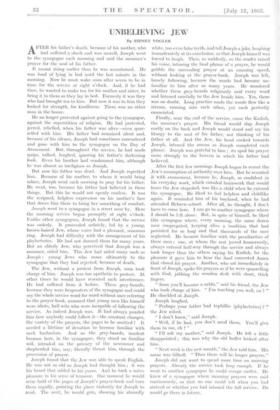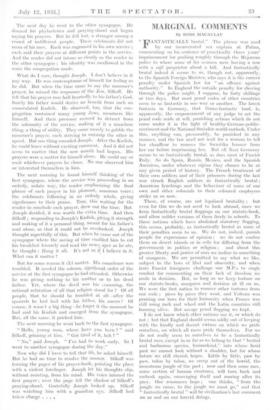UNBELIEVING JEW
By SIDNEY VOGLER
AFTER his father's death, because of his mother, who had suffered a shock and was unwell, Joseph went to the synagogue each morning and said the mourner's prayer for the soul of his father.
It meant rising earlier than he was accustomed. He was fond of lying in bed until the last minute in the morning. Now he must wake soon after seven to be in time for the service at eight o'clock. And, if he had time, he wanted to make tea for his mother and sister, to bring it to them as they lay in bed. Formerly it was they who had brought tea to him. But now it was to him they looked for strength, for kindliness. There was no other man in the house.
He no longer protested against going to the synagogue, against the superstition of religion. He had protested, jeered, rebelled, when his father was alive—even quar- relled with him. His father had remained silent and, because of his silence, Joseph had sometimes surrendered and gone with him to the synagogue on the Day of Atonement. But, throughout the service, he had made quips, talked, laughed, ignoring his father's darkening look. Even his brother had condemned him, although he was almost as irreligious as Joseph.
But now his father was dead. And Joseph regretted him. Because of his mother, to whom it would bring solace, Joseph went each morning to pray for his father. He went, too, because his father had believed in these things. But this he would not openly confess. It was the resigned, helpless expression on his mother's face that drove him there to bring her something of comfort.
Joseph went to a synagogue in a street near by. Here the morning service began promptly at eight o'clock. Unlike other synagogues, Joseph found that the service was orderly. It proceeded sedately, led by a young, .brown-haired Jew, whose voice had a pleasant, sonorous ring. Joseph had difficulty with the arrangement of his phylacteries. He had not donned them for many years. But an elderly Jew, who perceived that Joseph was a mourner, aided him. This Jew had aided many such as 'Joseph ; young Jews who came ultimately to the synagogue that they had rejected, because of death.
The Jew, without a protest from Joseph, soon took charge of him. Joseph was too apathetic to protest. At other times he would have resented such interference. He had suffered from it before. These grey-beards, because they were frequenters of the synagogue and could say the whole service word for word without once referring to the prayer-book, assumed that young men like himself were idiots, half-wits who were incapable of following the service. As indeed Joseph was. It had always puzzled him how anybody could follow, it—the constant changes, the variety of the prayers, the pages to be omitted 1 It needed a lifetime of devotion to become familiar with such barbarism. And so the grey-beards, insolent because here, in the synagogue, they stood on familiar soil, intruded on the privacy of the newcomer and shepherded him, nay, literally thrust him, through the procession of prayer.
Joseph found that the Jew was able to speak English. He was not as old as Joseph had thought him ; it was his beard that added to his years. And he took a naïve pleasure in his sense of humour. One moment he would seize hold of the pages of Joseph's prayer-book and turn them rapidly, pointing the place violently for Joseph to read. The next, he would grin, showing his absurdly white, too-even false teeth, and tell Joseph a joke, laughing immoderately at its conclusion, so that Joseph himself was forced to laugh. Then, as suddenly, as the reader raised his voice, intoning the final phrase of a prayer, he would gabble the succeeding prayer at an amazing speed, without looking at the prayer-book. Joseph was left, lamely following, because the words had become un- familiar to him after so many years. He wondered whether these grey-beards religiously said every word and listened carefully to the Jew beside him. Yes, there was no doubt. Long practice made the words flow like a stream, running into each other, yet each perfectly enunciated.
Finally, near the end of the service, came the Kadish, the mourner's prayer. His friend would slap Joseph curtly on the back and Joseph would stand and say his liturgy to the soul of his father, • not thinking of his father at all. And the Jew, his head cocked towards Joseph, intoned the amens as Joseph completed each phrase. Joseph was grateful to him ; its sped his prayer more strongly to the heaven in which his father had believed.
After the first few mornings Joseph began to resent the Jew's assumption of authority over him. But he resented it with amusement, because he, Joseph, so confident in his everyday work, which entailed brainwork that would leave the Jew stupefied, was like a child when he entered the synagogue. He liked to feel helpless and childlike again. It reminded him of his boyhood, when he had attended Hebrew-school. After all, he thought, I don't have to come here. I can go to another synagogue where I should be kft alone. But, in spite of himself, he liked -this synagogue where, every morning, the same dozen men congregated, keeping alive a tradition that had persisted for so long and that thousands of the race neglected. He became familiar with the peculiarities of these men ; -one, at whom the rest jeered humorously, always entered half-way through the service and always took longer than the others saying his Kadish, for the pleasure it gave him to hear the final concerted Amen that closed his prayer. Another, who sat immediately in front of Joseph, spoke his prayers as if he were quarrelling with God, jabbing the wooden desk with short, thick fingers.
" Soon you'll become a rabbi," said his friend, the Jew who took charge of him. " I'm teaching you well, no ? He chuckled at Joseph.
Joseph laughed.
" Perhaps your father had tephillin (phylacteries) 2 " the Jew asked.
" I don't know," said Joseph.
" Well, if he had, you don't need them. You'll give them to me, eh ? "
" I'll ask my mother," said Joseph. He felt a little disappointed ; this was why the old buffer looked after him.
" Next week is the new month," the Jew told him. His name was Silkoff. " Then there will be longer prayers."
Joseph did not want to spend more time on morning prayers. Already the service took long enough. If he went to another synagogue he could escape earlier. He knew of a synagogue where morning prayers were said continuously, so that no one could tell when you had arrived or whether you had intoned the full service. He would go there in future. The next day he went to the other synagogue. He donned his phylacteries and praying-shawl and began saying his prayers. But he felt lost, a stranger among a crowd of indifferent people. These celebrants did not seem of his race. Each was engrossed in his own service ; each said their .prayers at different points in the service. And the reader did not intone as clearly as the reader in the other synagogue ; his identity was swallowed in the noise the congregation made.
What do I care, thought Joseph. I don't believe in it any way. He was contemptuous of himself for feeling as he did. But when the time came to say the mourner's prayer, he missed the responses of the Jew, Silkoff. He felt that his prayer rose half-heartedly to his father's God. Surely his father would derive no benefit from such an emasculated Kadish. He observed, too, that the con- gregation contained many young Jews, mourners like himself. And their presence seemed to detract from • the solemnity of the service, making of it a mundane thing, a thing of utility. They came merely to gabble the mourner's prayer, each striving to outstrip the other in speed. But one thing consoled Joseph. After the Kadish, lie could leave without exciting comment. And it did not seem to matter that the new month had begun. His prayers were a matter for himself alone. He could say or omit whichever prayers he chose. No one observed him or interested themselves in him.
The next morning lie found himself thinking of the first synagogue, where the service was proceeding in an orderly, sedate way, the reader emphasizing the final 'phrase of• each prayer in his pleasant, sonorous voice ; the celebrants following in an orderly whole, giving significance to their praise. True, this waiting for the reader to conclude each prayer, drew out the time. But Joseph decided, it was worth the extra time. And then Silkoff ; responding to Joseph's Kadish, giVing it strength and making of it a personal thing, meant for his father's soul alone, so that it could not be overlooked. JoSeph thought regretfully of thiS. But when he came out of the synagogue where the saving of time enabled him to eat his breakfast leisurely and read the newsi•aper as he ate, he thought : Hang it all. It's not as if I believe in it. What can it matter ?
But for some reason it dil matter. His conscience was troubled. It needed the solemn, significant order of the service at the first synagogue lie had attended. Otherwise he was giving nothing to his mother or to his dead father. Yet, where the devil was his seasoning, the rational refutation of all that religion stood for ? Of all people, that he should be troubled at all—after the quarrels he had had with his father, his sneers / Of course, it wasn't a big thing—he forget it the moment he had said his Kadish and emerged from the synagogue. But, all the same, it pricked him.
The next morning he went back to the first synagogue. " Hallo, young man, where have you been ? " said Silkoff, grinning at him. " Got tired of it, heh ? "
" No," said Joseph. " I've had to work early. So I went to another synagogue during the day."
Now why did I have to tell that fib, he asked himself. But he had no time to resolve the answer. Silkoff was turning the pages of his prayer-book, pointing the place with a violent forefinger. Joseph let his thoughts slip, without resisting, from his mind. His voice intoned the first prayer ; over the page fell the shadow of Silkoff's praying-shawl. Gratefully Joseph looked up. Silkoff was watching him with a guardian eye. Silkoff had taken charge . .











































 Previous page
Previous page